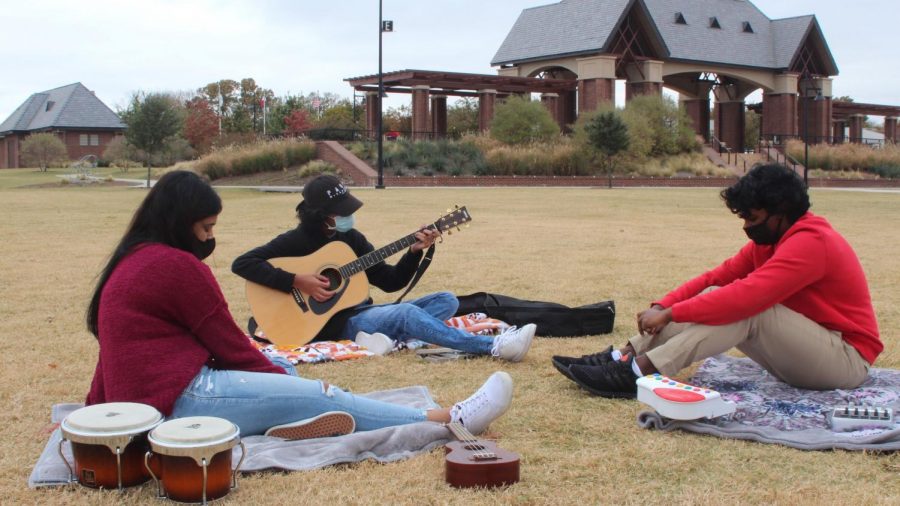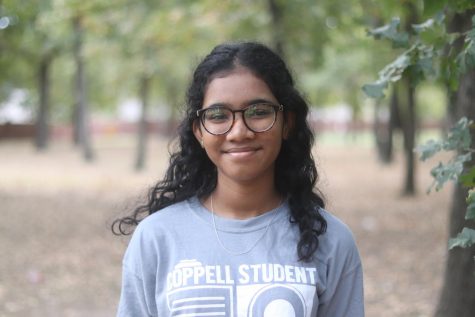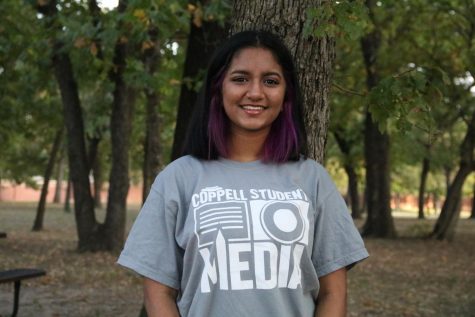Three talents collide in making music
Coppell High School juniors Faiza Rahman, Raghav Vemuganti and Joseph Mathew get together for the first time since March, when they last played together, at Andy Brown Park East over Thanksgiving break. Vemuganti, Rahman and Mathew have created and released music together without meeting in person over the summer.
December 3, 2020
As eighth graders at Coppell Middle School North, singing and travelling together in a performing choir, Faiza Rahman, Raghav Vemuganti and Joseph Mathew would discuss forming a band – though only as a potential idea for the future. They had sung together and knew how their voices compliment one another, but it was almost three years later that they would come together to produce music on their own.
“We never got around to [making music] then,” Rahman, now a junior at New Tech High @ Coppell, said. “When quarantine came around, Raghav reached out to me after a very long time to help with a song [he was working on]. We then created our first song, Bittersweet Boulevard. Joseph was a part of the next song, and it was great. Since then, we try to spend all our free time making music.”
Rahman, Vemuganti and Mathew resort to FaceTime calls to conduct their collective brainstorming and to put out melody or lyric suggestions. Rahman is fond of poetry and is thus responsible for most lyrics, while Vemuganti and Mathew, both juniors at Coppell High School, incline to experimenting with melodies on their instruments. Because of concerns related to COVID-19, collaborating online has been effective for them.
“Usually, if you were to make music, you’d get together, and you’d talk and write,” Vemuganti said. “You could record [a song] in one or two sittings, but the difficulty for us was finding time and coordinating calls. We had to make sure we were all on the same page with what we wanted the song to sound like. Also, just deciding who’d sing what part, and how we were going to learn our parts that we wrote in order to record it as a larger project felt [disorderly] at first.”
Though this undertaking resulted in music becoming a more encompassing aspect of their daily lives, music had already been a big part of their personal histories. Rahman, who has been in school choirs since sixth grade, sings in the CHS A Capella choir and is a part of Madrigals, a chamber choir. Vemuganti learned to play the piano, acoustic and bass guitars, as well as the clarinet. Mathew has been playing the piano since he was seven years old, and also played at Carnegie Hall as a sophomore.
“[Vemuganti] sent me one of their tracks early this year,” Coppell associate choir director Aaron Coronado said. “I thought it was amazing, and I was surprised that they put that out together. I’ve never had them in a class together and never seen them as a group, but [their collaboration] is obviously working because their music was really good.”
Piano melodies and chords, string instrument backgrounds and percussion dominate the instrumentals in their songs. They tend to lean away from fast paced or distorted vocals and sounds.
“We take inspiration from influential bands like [The Beatles, ABBA and Queen],” Mathew said. “I would say our style of music is similar to that you find in the ‘90s; we don’t have very modern-sounding music. I might describe our songs as a mix of modern pop-music and classic rock.”
The process of producing a song starts with a FaceTime call, and then moves on to improving on rudimentary melodies and lyrics. Vemuganti figures out most basic chords and motifs, which he and Mathew then develop on and add to. Rahman, after a group discussion and agreement on what ideas the song should focus on, composes lyrics that compliment the tone of the instruments. After an outline of their song is formed and the instrumentals taped, each person records their vocal parts. These are sent to Vemuganti, who mixes them with features in GarageBand.
“We use a distributor, TuneCore, to upload the songs to different platforms like Pandora, Spotify, Apple Music and YouTube music,” Rahman said. “Our songs on Spotify are what we promote [on social media], since there is a completely different app called Spotify for artists, and we just find it more convenient.”
Though making and producing music needs time and dedication, Rahman, Mathew and Vemuganti do it for the satisfaction and as a means to bring them together. They do not define themselves as a band, since they do not prefer to only be seen as a collective – rather as three artists working together in a creative undertaking.
“It’s always rewarding and satisfying to see a whole song come together,” Vemuganti said. “Recording is a long process, and we plan out things but don’t exactly know what it’s going to sound like. After slowly building your way up into something that you like and agreeing about the sound [of the finished song], knowing that we’re not going to change anything, that’s the most fun part [of the process]. I love listening to a song and being proud of what we made.”
Because of the struggle to find time and the increasing responsibilities as they go through their last years of high school, they do not know how long they plan to continue making music together. However, their virtual collaboration space makes it relatively easier to continue with producing music as a hobby after high school and through college.
“The best part of producing music is doing it with people you care about,” Mathew said. “We are all close friends, and we have known each other for a long time. We are connected doing something that we’re all interested in and passionate about. [Making music] brings us together, and it’s just a lot of fun.”
Follow Nanditha (@nanditha__n) and @CHSCampusNews on Twitter.











